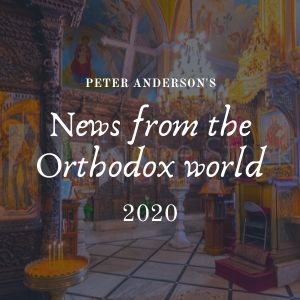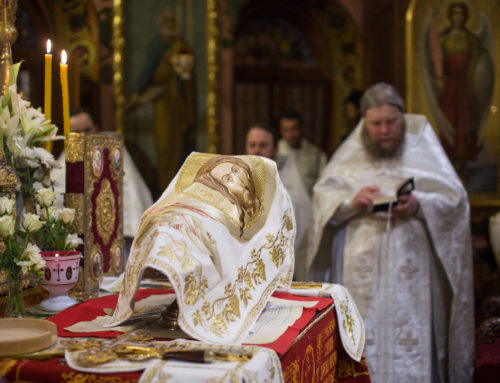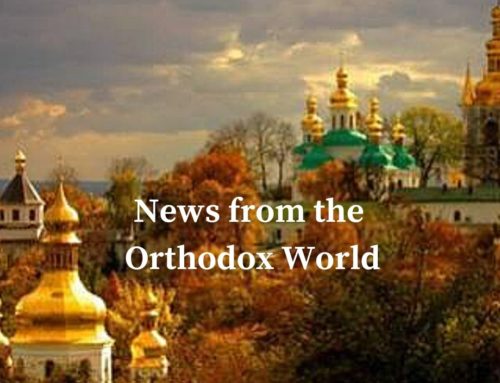Peter Anderson reports from the Orthodox world.
Longstanding reporter of the news from the Eastern Church, Peter Anderson shares our dream of a unified Christianity. His love for Orthodoxy has driven him to this personal mission to share the news of East with the world through his email list. The Urbi et Orbi Foundation is proud to share his efforts and his insights with you.

It appears that Catholic Archbishop Tadeusz Kondrusiewicz of Minsk, who has been refused reentry into Belarus since August 31, may be able to celebrate Christmas Mass in Minsk this year. On December 22, Belarusian Minister of Foreign Affairs Vladimir Makei revealed that Archbishop Claudio Gugerotti, who had met with President Lukashenko on December 17, had brought to Lukashenko a personal letter from Pope Francis. https://eng.belta.by/politics/view/lukashenko-responds-to-popes-request-about-archbishop-tadeusz-kondrusiewicz-136114-2020/ In remarks to journalists, Makei stated as follows:
This letter contains a request related to a well-known personality, Metropolitan of Minsk and Mogilev Archbishop Tadeusz Kondrusiewicz. Out of deepest respect for the Pope and because of good personal relations, the Belarusian head of state considered it possible to meet the Pope’s request and gave an instruction to find a solution to the issue, taking into account all available legal mechanisms. The upcoming great holiday of Christmas and festive events were an additional reason to take this decision on Metropolitan of Minsk and Mogilev Archbishop Tadeusz Kondrusiewicz despite a number of negative things about this person.
Later in the day, Archbishop Ante Jozić, apostolic nuncio to Belarus, issued a statement which included the following: “The Apostolic Nunciature in the Republic of Belarus informs that on December 22, 2020, it received information from the competent state bodies that Archbishop Tadeusz Kondrusiewicz has no obstacles to return to the territory of the Republic of Belarus.” The statement also thanked the State Authorities of Belarus “for responding positively to Pope Francis’ request to return Archbishop Tadeusz Kondrusiewicz to celebrate the Nativity of the Lord with the faithful of which he is pastor.” https://catholic.by/3/news/belarus/12636-pavedamlenne-apostalskaj-nuntsyyatury-respublitsy-belarus#ad1 From this, it appears extremely likely that Kondrusiewicz will return to Belarus on December 23 or 24.
This, of course, is very good news. It may also be a move which is advantageous to the Lukashenko government. During the exile of Kondrusiewicz, the acting head of the Catholic Church in Belarus has been the vicar general, Bishop Yuri Kasabutsky. Kasabutsky has recently used stronger language against the Lukashenko government’s repression of protesters than the criticisms previously made by Kondrusiewicz. As discussed in my last report, Kasabutsky was given a formal warning concerning his strong statements and informed by the government that he would be arrested if he continued to make such statements. Kasabutsky responded to the authorities that he “didn’t feel any fear and they wouldn’t scare me.” https://www.agensir.it/europa/2020/12/10/preti-arrestati-mons-kasabutsky-minsk-ci-vogliono-zittire-ma-noi-non-abbiamo-paura/ In view of such defiance, the authorities were faced with the prospect of arresting and incarcerating Bishop Kasabutsky. With Kondrusiewicz exiled and Kasabutsky in jail, the Catholic Church would certainly have a good case that it was being persecuted by the Belarusian government. With the return of Kondrusiewicz, Kasabutsky will probably be far less vocal, and Kondrusiewicz will probably set the tone which will be more cautious. It should also be remembered that on January 3, 2021, Archbishop Kondrusiewisz will be 75 years old. Under canon law he must submit his letter of resignation at age 75. However, the resignation will not be effective until accepted by the Pope, and it is possible that the Pope may delay accepting it for even a number of years. With respect to the current situation of the Catholic Church in Belarus, journalist Jonathan Luxmoore has written a good English-language article including a number of interesting direct interviews. https://www.ncronline.org/news/world/catholics-belarus-winter-brings-fears-renewed-repression
With respect to the Orthodox Church in Belarus, there is the disconcerting news that Metropolitan Filaret, emeritus exarch of Belarus, has been hospitalized and prayers have been requested for his recovery. https://www.church.by/news/cerkov-molitsja-o-zdravii-mitropolita-filareta The foregoing official notice states that the hospitalization was due to his “age” and that his condition was satisfactory. However, a letter from Metropolitan Veniamin states that Metropolitan Filaret contracted the Covid virus. https://www.kp.by/online/news/4127065/ He was metropolitan of Minsk from 1978 to 2013 and chairman of the Moscow Patriarchate’s DECR from 1981 to 1989.
Metropolitan Veniamin together with representatives of other traditional religions have signed an appeal for peace in Belarus. https://www.church.by/news/glavy-i-predstaviteli-tradicionnyh-konfessij-belarusi-podpisali-obrashenie-o-mire The appeal states in part: “The calendar year is coming to an end and we turn our word of love with emotion to each compatriot and call for peace, forgiveness and reconciliation; we urge you to forget your grievances and continue to build our common home again and together.” Interestingly, the Catholic representative who signed the appeal was Apostolic Nuncio Archbishop Ante Jozić and not any of the local Catholic bishops.
The Moscow website Orthodox Christianity has provided a good English-language translation of the important interview of Metropolitan Hilarion by the Greek newspaper Kathimerini. https://orthochristian.com/136188.html (part one); https://orthochristian.com/136198.html (part 2). Archbishop Chrysostomos has given an interview in which he strongly disagrees with a numbers of the points made by Metropolitan Hilarion. https://orthodoxtimes.com/archbishop-of-cyprus-russian-orthodox-church-is-not-an-example-to-follow-i-am-sorry-to-say-that/
Archbishop Anastasios has given an interview relating to Covid and his recent hospitalization. https://www.romfea.gr/ekklisies-ts/ekklisia-albanias/41135-albanias-anastasios-i-orthodoji-enotita-exei-ragisei-kai-parateinetai At the end of the interview, he is asked about the religious situation in Ukraine. With respect to the divisions in Ukraine, he states:
The initiatives in Ukraine, after two years already, obviously did not yield the desired therapeutic effect. Neither peace nor unity was achieved for the millions of Ukrainian Orthodox. Instead, controversy and division spread to other local Orthodox Churches. Now it is urgent to do something effective. The time that passes worsens the trauma. The enormous danger to Orthodoxy is obvious: an ethno-racial divide (among Greeks, Slavs and those who want harmonious relations with all), which nullifies the multicultural character of Orthodoxy and its universality. This is the greatest danger, not only for Orthodoxy, but for all of Christianity.
He also states: “The initiative for the treatment of the new reality undoubtedly belongs to the Ecumenical Patriarchate, but all the Autocephalous Churches must, to the extent of their responsibility, contribute to the reconciliation, in overcoming the gap.” This again, like the recent letter from the Orthodox bishops of Poland, is a call for something to be done. With the Orthodox rule requiring a complete consensus for pan-Orthodox decisions, it is clear that any solution to the crisis in Ukraine must be acceptable to both Constantinople and Moscow. What is really needed, in my personal opinion, is suggested compromise solutions which might be acceptable to both Constantinople and Moscow and not just appeals for reconciliation and unity. From my observations on the Internet, there seems to be a great silence with respect to this practical aspect.
In Rome, it was announced today that Pope Francis has signed a degree recognizing the “heroic virtues” of eight individuals including “the heroic virtue of the Servant of God Bernardo Antonini, diocesan Priest; born 20 October 1932 at Cimego, Italy; died at Karganda, Kazakhstan on 27 March 2002.” https://www.vaticannews.va/en/pope/news/2020-12/causes-for-canonization-advanced-with-publication-of-decrees.html A good summary of his life is found at https://cathmos.ru/priznany-geroicheskie-dobrodeteli-slugi-bozhego-bernardo-antonini/. Beginning in 1991, he headed the new Catholic seminary in Russia and was beloved by many.
Anderson, Seattle USA


